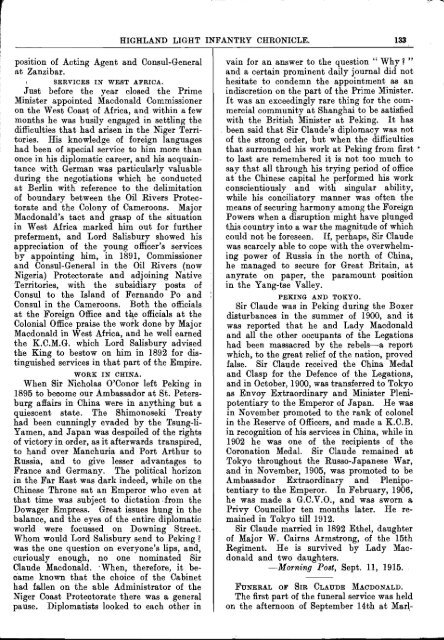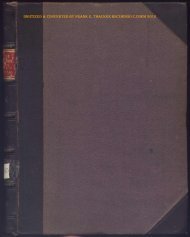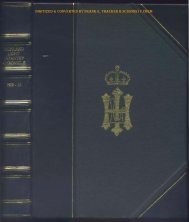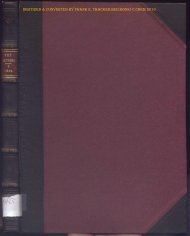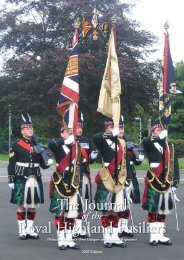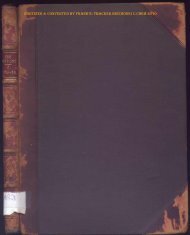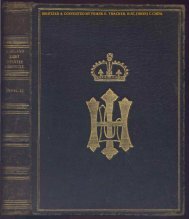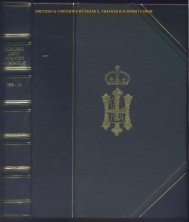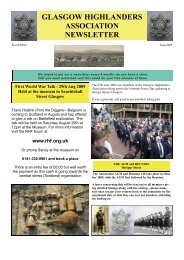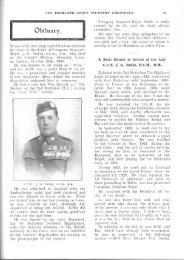HLI Chronicle 1915 - The Royal Highland Fusiliers
HLI Chronicle 1915 - The Royal Highland Fusiliers
HLI Chronicle 1915 - The Royal Highland Fusiliers
Create successful ePaper yourself
Turn your PDF publications into a flip-book with our unique Google optimized e-Paper software.
HIGHLAND LIGHT INFANTRY CHRONICLE.<br />
133<br />
position of Acting Agent and Consul-General<br />
at Zanzibar.<br />
SERVICES IN WEST AFRICA.<br />
Just before the year closed the Prime<br />
Minister appointed Macdonald Commissioner<br />
on the West Coast of Africa, and within a few<br />
months he was busily engaged in settling the<br />
difficulties that had arisen in the Niger Territories.<br />
His knowledge of foreign languages<br />
had been of special service to him more than<br />
once in his diplomatic career, and his acquaintance<br />
with German was particularly valuable<br />
during the negotiations which he conducted<br />
at Berlin with reference to the delimitation<br />
of boundary between the Oil Rivers Protectorate<br />
and the Colony of Cameroons. Major<br />
Macdonald's tact and grasp of the situation<br />
in West Africa marked him out for further<br />
preferment, and Lord Salisbury showed his<br />
appreciation of the young officer's services<br />
by appointing him, in 1891, Commissioner<br />
and Consul-General in the Oil Rivers (now<br />
Nigeria) Protectorate and adjoining Native<br />
Territories, with the subsidiary posts of<br />
Consul to the Island of Fernando Po and<br />
Consul in the Cameroons. Both the officials<br />
at the Foreign Office and the officials at the<br />
Colonial Office praise the wofk done by Major<br />
Macdonald in West Africa, and he well earned<br />
the K.C.M.G. which Lord Salisbury advised<br />
the King to bestow on him in 1892 for distinguished<br />
services in that part of the Empire.<br />
WORK IN CHINA.<br />
When Sir Nicholas O'Conor left Peking in<br />
1895 to become our Ambassador at St. Petersburg<br />
affairs in China were in anything but a<br />
quiescent state. <strong>The</strong> Shimonoseki Treaty<br />
had been cunningly evaded by the Tsung-li<br />
Yamen, and Japan was despoiled of the rights<br />
of victory in order, as it afterwards transpired,<br />
to hand over Manchuria and Port Arthur to<br />
Russia, and to give lesser advantages to<br />
France and Germany, <strong>The</strong> political horizon<br />
in the Far East was dark indeed, while on the<br />
Chinese Throne sat an Emperor who even at<br />
that time was subject to dictation ·from the<br />
Dowager Empress. Great issues hung in the<br />
balance, and the eyes of the entire diplomatic<br />
world were focussed on Downing Street.<br />
Whom would Lord Salisbury send to Peking?<br />
was the one question on everyone's lips, and,<br />
curiously enough, no one nominated Sir<br />
Claude Macdonald. 'When, therefore, it became<br />
known that the choice of the Cabinet<br />
had fa.llen on the able Administrator of the<br />
Niger Coast Protectorate there was a general<br />
pause. Diplomatists looked to each other in<br />
vain for an answer to the question" Why 1 ..<br />
and a certain prominent daily journal did not<br />
hesitate to condemn the appointment as an<br />
indiscretion on the part of the Prime Minister.<br />
It was an exceedingly rare thing for the commercial<br />
community at Shanghai to be satisfied<br />
with the British Minister at Peking. It has<br />
been said that Sir Claude's diplomacy was not<br />
of the strong order, but when the difficulties<br />
that surrounded his work at Peking from first •<br />
to last are remembered it is not too much to<br />
say that all through his trying period of office<br />
at the Chinese capital he performed his work<br />
conscientiously and with singular ability,<br />
while his conciliatory manner was often the<br />
means of securing harmony among the Foreign<br />
Powers when a disruption might have plunged<br />
this country into a war the magnitude of which<br />
could not be foreseen. If, perhaps, Sir Claude<br />
was scarcely able to cope with the overwhelming<br />
power of Russia in the north of China,<br />
he managed to secure for Great Britain, at<br />
anyrate on paper, the paramount position<br />
in the Yang-tse Valley.<br />
PEKING AND TOKYO.<br />
Sir Claude was in Peking during the Boxer<br />
disturbances in the summer of 1900, and it<br />
was reported that he and Lady Macdonald<br />
and all the other occupants of the Legations<br />
had been massacred by the rebels~a report<br />
which, to the great relief of the nation, proved<br />
false. Sir Claude received the China Medal<br />
and Clasp for the Defence of the Legations,<br />
and in October, 1900, was transferred to Tokyo<br />
as Envoy Extraordinary and Minister Plenipotentiary<br />
to the Emperor of Japan. He was<br />
in November promoted to the rank of colonel<br />
in the Reserve of Officers, and made a K.C.B.<br />
in recognition of his services in China, while in<br />
1902 he was one of the recipients of the<br />
Coronation Medal. Sir Claude remained at<br />
Tokyo throughout the Russo-Japanese War,<br />
and in November, 1905, was promoted to be<br />
Ambassador Extraordinary and Plenipotentiary<br />
to the Emperor. In February, 1906,<br />
he was made a G.C.V.O., and was sworn a<br />
Privy Councillor ten months later. He remained<br />
in Tokyo till 1912.<br />
Sir Claude married in 1892 Ethel, daughter<br />
of Major W. Cairns Armstrong, of the 15th<br />
Regiment. He is survived by Lady Macdonald<br />
and two daughters.<br />
-Morning Post, Sept. 11, <strong>1915</strong>.<br />
FUNERAL OF SIR CLAUDE MACDONALD.<br />
<strong>The</strong> first part of the funeral service was held<br />
on the afternoon of September 14th at Mar~-


